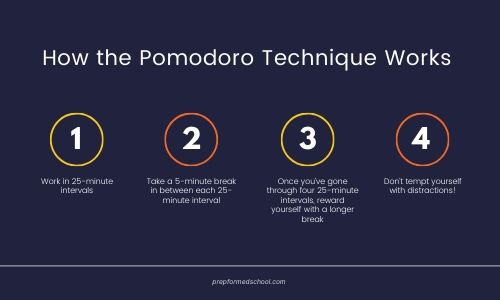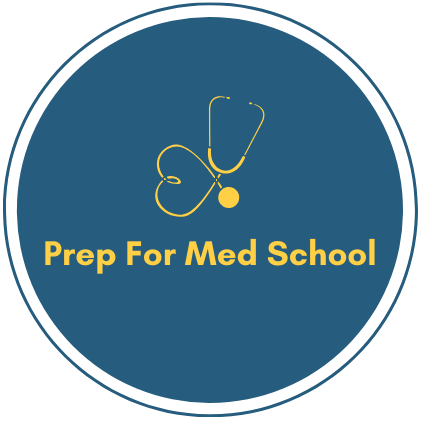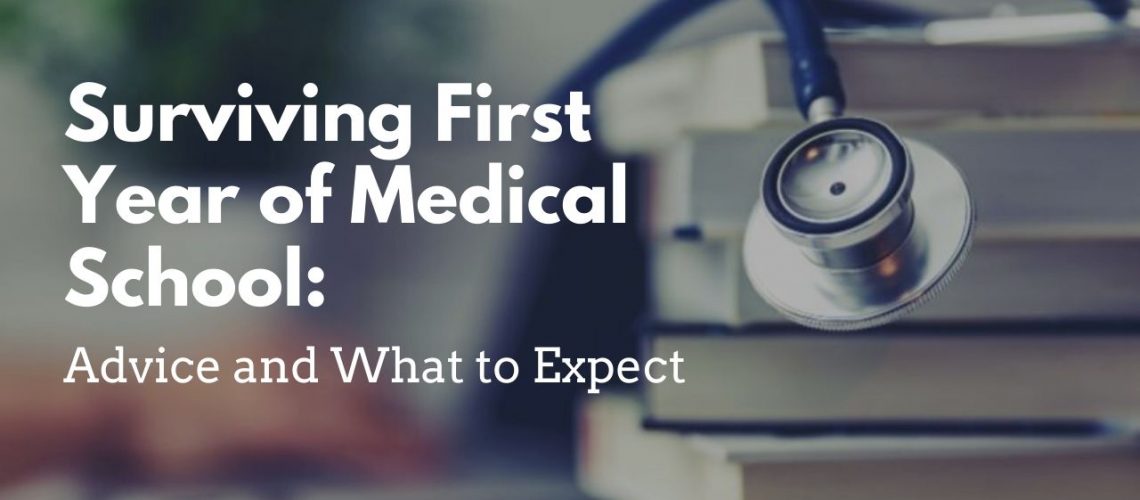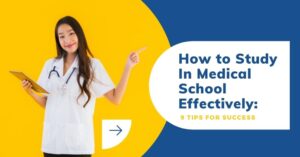Brace yourself for your first year of medical school. It will feel like the longest year of your life. There is, though, a light at the end of the tunnel. When a patient expresses gratitude for your care, all those long nights studying in the library will make it all worth it.
Most medical school curriculums dedicate the first two years to fact-cramming. Much of the material may not seem relevant to patient care, but it will be the foundation that your clinical years (3rd and 4th year) will be built upon.
What does that mean? Study. And study some more. The basics of medical knowledge is not something you can reason your way through, it requires a time commitment.
Table of Contents
Typical Day of First Year Student
So what does a typical day of a first-year medical student look like? Here is a schedule that is pretty common.
Weekdays
- 7 am – 8 am: Breakfast, wake-up routine
- 8 am -12 pm: Classes focused on anatomy and medical foundations (cell and molecular biology, pharmacokinetics)
- 12 pm – 1 pm: Relax, lunch, and hang out with your classmates.
- 1 pm – 4 pm: More classes!
- 4 pm – 5 pm: Decompress for at least an hour. Catch dinner with friends, call your family, go for a quick run, make a quick visit to the gym.
- 5 pm – 6 pm: Shower, dinner, self-care.
- 6 – 10 pm: Dedicate about 30-45 minutes for each lecture earlier in the day and skim over the material.
Weekends
Do another comb-over of all the material learned in the week, but in greater depth. Test your knowledge by doing questions related to these topics. The weekends are your time too, though. Find what makes you happy, and make sure you carve out time in your schedule for that as well.
First Year Academics
To go to class or not to go to class.
Classes went from 8 am – 12 pm, then 1 pm-4 pm – that’s a solid 8 hours every weekday! Consider whether heading into campus is worth your time. Many medical schools now broadcast their lectures, so if you are able to stay regimented, watching them online may be an effective alternative.
What Materials Should I Study From?
Depending on your school, you will be tested through either an instructor-written exam or the NBME (National Board of Medical Examiners) shelf exam. This is where upperclassmen advice is gold. Ask them what resources they used for success.
Some resources to consider:
- Flashcards: Much of the first year requires brute memorization. Make your own, or use flashcard decks from classmates. There are a number of apps, such as Anki or Quizlet, that will help you make flashcards seamlessly. You can then upload them onto your phone. It allows you to do them anytime, anywhere. Whether it be waiting for the next class to begin, or topping off your gas tank – flip through these flashcard decks. Reiteration is key.
- Sketchy Medical: Sketchy Medical presents memorable, narrated stories that serve as learning devices. Even though I haven’t been tested on the material I learned from Sketchy for over three years, I’m still able to recall a lot of the knowledge I gained from it. I highly recommend it.
- First Aid: The bible of medical school. All information that you need to know is presented in this resource, but it only serves as a backbone. Annotate the First Aid outline as you learn the material, so you’ll have comprehensive notes when Step 1 comes around.
Question Banks
I had a lot of difficulty putting faith in questions, grappling with the fact that questions didn’t cover all the material I needed to know. My board scores jumped immensely when I spent the majority of my study time on questions. Your goal should be to finish all the available questions for that particular exam before test day comes.
For subject exams during medical school, I used NBME self-assessment exams (Found here: https://www.nbme.org/taking-assessment/self-assessments). If you’re looking for more resources, I also dabbled with Firecracker and Kaplan.
For boards studying (the Steps), I solely used UWorld. There’s about 1, 500 questions in the UWorld question bank for each step. UWorld IS amazing. It offers detailed descriptions on why an answer is right, and also why the other answer choices are incorrect.
Food for thought – USMLE Step 1 is now Pass/Fail
In February 2020, Step 1, the first board exam required of medical students, was deemed pass/fail. Although it may seem like a blessing, there are things to consider. When you apply for residency, programs need to differentiate between applicants. My conjecture is more weight will be placed on other factors on your application.
Standing Out When Step 1 Is Pass/Fail
In my opinion, here are the things you might need to do to stand out now that Step 1 is pass/fail:
1/ You might need to score better on the second board exam, Step 2 CK. That doesn’t mean you can slack until Step 2 CK comes around, which is traditionally taken at the end of third year. You need those foundational concepts to be solid before expanding into concepts you will see in clinical medicine.
2/ Your class scores may be more important. My medical school had three categories – Pass, Fail, and Honors. There’s an ongoing joke that P = MD (Pass = medical doctor). So…cruise for that pass, and call it a day? If you’re aiming for a more competitive residency, how well you score actually does matter.
During the residency application season, the administration will divide the class into quartiles based on how well you performed. Every medical school is different. Check with the administrative office to get an idea of how this will pan out for you.
 An example of how my medical school portrayed my first semester scores.
An example of how my medical school portrayed my first semester scores.
3/ Extra-curricular activities may be more expected of you. Certain activities you can consider are:
- Volunteer at local organizations or your associated hospital
- Shadow a physician and see which specialty matches your personality and lifestyle
- Participate in research – check the hospital for clinical opportunities, or the graduate school for bench research
Study Habits That Will Ensure Success
Figure Out How You Study
Acquiring knowledge in medical school is done at a breakneck pace. After every exam, evaluate whether your learning style is working. One thing I did notice is there is a huge difference between passive and active learning. This is how I differentiate them in my mind:
| Passive Learning | Active Learning |
– Making notes – Annotating text – Watching videos – Listening to lectures | – Doing questions – Teaching concepts to others – Collaborate with classmates – Flashcards |
It’s hard to let go of passive learning techniques – I think this is what is conventionally taught to work in our undergraduate years. Active learning worked wonders for me in medical school. It significantly cut my studying time, and boosted my score as well. A win-win situation. I would say 40% passive learning and 60% active learning is a good balance between the two.
Time is of the Essence
There won’t be a lot of free time in medical school, therefore, you need to make time. I drew up my schedule for every day, and every hour was dedicated to something specific. I used the Pomodoro technique to keep me on track.
How the Pomodoro Technique Works
Work in 25-minute intervals. Take a 5-minute break in between each 25-minute interval. Once you’ve gone through four 25-minute intervals, reward yourself with a longer break.
Also, don’t tempt yourself with distractions! I blocked certain sites during my study period. I even went as far as unplugging my internet or going to a coffee shop without my laptop and phone to keep myself focused.

Don’t Procrastinate
I was the queen of the 48-hour cram in undergrad. I somehow skated by the skin of my teeth with this method in college. It doesn’t work for ANYONE in medical school. You either know the information, or you don’t. Put the time into learning medicine, and you will be rewarded with success.
As alluded to above, you should always go over the material you learned earlier in the day. No excuses! There is an 8-hour commitment to classes every weekday, so if you get behind, you won’t have much time to make up for it. I took about a total of 8 hours off on the weekend when a test wasn’t looming the week ahead, and about 2 hours on the weekend when test day was in the midst.
Some General Advice To Wrap Things Up
Find Your Tribe
You will find that your family, friends, and significant others who aren’t familiar with the medical field won’t understand why you are studying so much. People will ask why you fell off the face of the earth. Find comfort in your classmates that will understand exactly what you are going through. I had a small group of friends in my class that I couldn’t have survived without. Build relationships in medical school and make sure you find that tribe you call when things go wrong.
It’s OK to Reach Out for Help
There were so many times I just didn’t get it. Don’t be afraid to ask a colleague for help. Need a little more support? Many medical schools hire upperclassmen to serve as tutors. Swing by a professor’s office for help, or go to office hours. Be proactive about getting your questions answered.
It’s Okay to Reach Out for Help for Personal Reasons, Too
The stress will get to you. From strained relationships to poor grades, I found myself crying a lot in medical school. It was more stress than I could ever imagine. Thankfully, our school offered free sessions with in-house psychologists. It was the best decision I ever made. My counselor offered a new perspective on my situation that I never saw before. It helped me become more optimistic in my mindset, and made it easier to cope.
Realize When Medicine May Not Be For You
A number of my classmates decided medicine wasn’t their true calling, and stepped away from it all. I respected them for their depth of self-reflection. Medicine is a huge investment in time and in money. Don’t stay in a profession that does not make you happy.
If medicine is for you, it WILL make you happy.
As an emergency medicine resident, I work 70+ hours on the regular, and it doesn’t even feel like work half the time. There is no other profession that would make me this happy or fulfilled by the end of a shift. Keep your head in the books, but keep your chin up. It will pay off, and it will get better!





